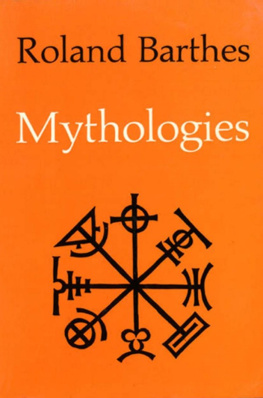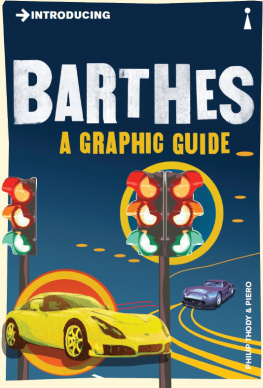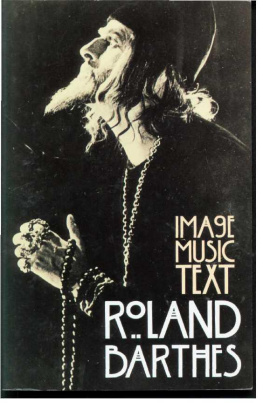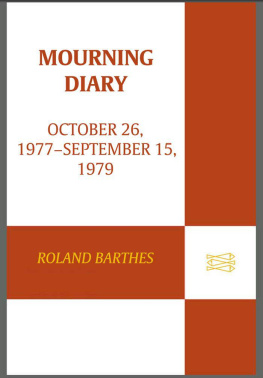Contents
Guide
Pages

In memory of my mother, Colombe Samoyault-Verlet
Barthes
A Biography
Tiphaine Samoyault
Translated by
Andrew Brown
polity
First published in French as Roland Barthes. Biographie, ditions du Seuil, 2015 This English edition Polity Press, 2017
This book is supported by the Institut franais (Royaume-Uni) as part of the Burgess Programme.

This work received the French Voices Award for excellence in publication and translation. French Voices is a program created and funded by the French Embassy in the United States and FACE (French American Cultural Exchange).
Polity Press
65 Bridge Street
Cambridge CB2 1UR, UK
Polity Press
350 Main Street
Malden, MA 02148, USA
All rights reserved. Except for the quotation of short passages for the purpose of criticism and review, no part of this publication may be reproduced, stored in a retrieval system, or transmitted, in any form or by any means, electronic, mechanical, photocopying, recording or otherwise, without the prior permission of the publisher.
ISBN-13: 978-1-5095-0565-4
A catalogue record for this book is available from the British Library.
Library of Congress Cataloging-in-Publication Data
Names: Samoyault, Tiphaine, author.
Title: Barthes : a biography / Tiphaine Samoyault.
Other titles: Roland Barthes Biographie English
Description: English edition. | Cambridge ; Malden, MA : Polity Press, [2016] | Previously published by Seuil : Paris, France in French as Roland Barthes. Biographie, c2015. | Includes bibliographical references and indexes.
Identifiers: LCCN 2016018321 (print) | LCCN 2016027065 (ebook) | ISBN 9781509505654 (hardcover : alk. paper) | ISBN 1509505652 (hardcover : alk. paper) | ISBN 9781509505685 (mobi) | ISBN 9781509505692 (epub)
Subjects: LCSH: Barthes, Roland. | Linguists--France--Biography. | Critics--France--Biography.
Classification: LCC P85.B33 S3613 2016 (print) | LCC P85.B33 (ebook) | DDC 410.92 [B] --dc23
LC record available at https://lccn.loc.gov/2016018321
The publisher has used its best endeavours to ensure that the URLs for external websites referred to in this book are correct and active at the time of going to press. However, the publisher has no responsibility for the websites and can make no guarantee that a site will remain live or that the content is or will remain appropriate.
Every effort has been made to trace all copyright holders, but if any have been inadvertently overlooked the publisher will be pleased to include any necessary credits in any subsequent reprint or edition.
For further information on Polity, visit our website: politybooks.com
Acknowledgements
This book came into being in response to a powerful and persuasive suggestion from Bernard Comment. I owe a great deal to his detailed knowledge of Barthess work, to his close and generous rereadings, and to his encouragements. May he be, at the threshold of this book, the first to be thanked.
The help and support of ric Marty and Michel Salzedo have also played a decisive role. This biography would never have seen the light of day without their trust, without the dialogues I enjoyed with them, or without the numerous documents they made available and gave me permission to consult. I am extremely grateful to them. Thanks in particular to ric Marty for certain very valuable suggestions.
A biography cannot be written in isolation. It draws on information conveyed by both books and word of mouth; it is inscribed within a memory, in both its insights and its omissions. I would like to begin by thanking all those who have talked to me about the Roland Barthes they knew, and granted me interviews: Jean-Claude Bonnet, Antoine Compagnon, Jonathan Culler, Rgis Debray, Michel Deguy, Christian Descamps, Pascal Didier, Colette Fellous, Lucette Finas, Franoise Gaillard, Anouk Grinberg, Roland Havas, Julia Kristeva, Mathieu Lindon, Alexandru Matei, Jean-Claude Milner, Maurice Nadeau, Dominique Noguez, Pierre Pachet, Thomas Pavel, Leyla Perrone-Moiss, Georges Raillard, Antoine Rebeyrol, Philippe Sollers and Franois Wahl.
I would also like to express my gratitude to the critics and scholars whose work has constituted an indispensable and valued basis for my understanding of Barthess life and work: first and foremost, Louis-Jean Calvet and Marie Gil, who wrote biographies of Barthes before me; also, Cecilia Benaglia, Thomas Clerc, Claude Coste, Alexandre Gefen, Anne Herschberg Pierrot, Diana Knight, Marielle Mac, Patrick Mauris, Jacques Neefs, Philippe Roger, Susan Sontag and Marie-Jeanne Zenetti.
I would like to thank, in their several institutions, the people who generously helped me with my research: Marie-Odile Germain and Guillaume Fau in the manuscripts department of the Bibliothque nationale de France, Nathalie Lger and Sandrine Sanson at the Institut Mmoires de ldition contemporaine and all the staff at the Abbaye dArdenne who welcomed me on several occasions.
At the ditions du Seuil, Flore Roumens followed the book as it took shape, with all her talent and enthusiasm; Jean-Claude Baillieul made several essential and detailed corrections. My warmest thanks to both of them.
To all those of my friends who kept me company during my progress on the book, I would also like to express my gratitude, especially: Bertrand Hirsch, Maurice Thron and Damien Zenone, and also Marie Alberto Jeanjacques, Christine Angot, Adrien Cauchie, Charlotte von Essen, Thomas Hirsch, Yann Potin, Zahia Rahmani, Marie-Laure Roussel and Martin Rueff.
Bibliographical note
Quotations from Barthess works are mainly taken from existing English translations. Where there is no translation published, references are to his complete works in French: Oeuvres compltes, new edition by ric Marty, 5 vols (Paris: Seuil, 2002). These cover Barthess books, shorter texts and interviews from 1942 to 1961 (vol. I), 1962 to 1967 (vol. II), 1968 to 1971 (vol. III), 1972 to 1976 (vol. IV), and 1977 to 1980 (vol. V). References to the Oeuvres compltes follow the format OC, volume number (as roman numeral) and page number e.g.: OC V, pp. 6345.
Archives are quoted in accordance with the French system; i.e. the class number of the Roland Barthes archive in the manuscript department of the Bibliothque nationale de France (BNF), followed by the number of the dossier consulted e.g. BNF, NAF 28630. Some documents have the former class number from the IMEC (Institut Mmoires de ldition contemporaine), where the archives were held until 2012.
The provenance of other unpublished documents is indicated in the notes.
Introduction
The voice
The aspect of Barthes that does not die is his voice. This is a strange phenomenon, since there is nothing more temporary than a voice. You need only listen to recordings from the past to realize this. A voice is soon outmoded, it dates the speaking body. Gide noted this with regard to himself, in his Journal: The most fragile part of me, and the one that has aged most, is my voice. Between two centuries, between two postulations the self and the world Barthes feels torn; contradictory, like his voice. This is what gives his oeuvre its powers of prefiguration. The avant-garde and revolt disfigure; the past refigures and the contemporary age configures. The undecided, paradoxical posture cannot adapt to clear-cut gestures. Quite the opposite: it arouses a sense of unease, a way of being a misfit that leads one to seek completely new solutions in order to exist all the same, to be of ones time in spite of everything. This quest, which sometimes took a shape so impetuous that Barthes brought upon himself the charge of opportunism or fickleness, defines the condition of the precursor, the one who runs on ahead. Literally, he goes ahead of fashions, proposals and movements. More abstractly, he also opens a path for thinking about a new order of the world and our knowledge of it. The end of the book, the extension of the sphere of the biographical, the fragment, the withdrawal from logical argument, the use of hypertext, the new mechanography of memory: these are some of the questions Barthes explored and that make his oeuvre a field to explore today. Like all great thinkers, his powers of anticipation were as great as the mark he left upon his time: if we still read him today, this is because his criticism took new paths.











